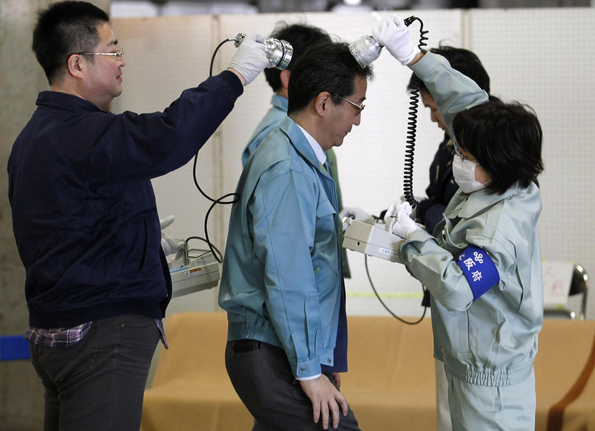Nuclear Meltdown
Japan nuclear accident no worse:WHO/IAEA
(Agencies)
Updated: 2011-04-13 10:08
 |
Large Medium Small |
|
 A man is tested for radiation in Koriyama, Fukushima Prefecture, northern Japan, April 12, 2011, located about 70 km (44 miles) from the tusnami-crippled nuclear reactor. Japan expanded the evacuation zone around a crippled nuclear plant on Monday because of high levels of accumulated radiation, as a strong aftershock rattled the area one month after a quake and tsunami sparked the worst nuclear crisis since Chernobyl.[Photo/Agencies] |
GENEVA/VIENNA - An increase in the severity level of Japan's nuclear accident does not mean the public health risk is any worse or that the disaster resembles Chernobyl in 1986, global expert bodies said on Tuesday.
"Our public health assessment is the same today as it was yesterday," World Health Organization spokesman Gregory Hartl told Reuters, explaining that the higher rating was the result of combining the amounts of radiation leaking from three reactors and counting them as a single incident.
"At the moment there is very little public health risk outside the 30-km (evacuation) zone."
Hartl said the Japanese authorities now had much more information than in the immediate aftermath of the disastrous quake and tsunami that smashed the Fukushima plant in northeast Japan on March 11.
"They are looking at the cumulative dose, but again this is at the reactor itself," he said. "Remember there is no one left ... around the reactor, it has been evacuated."
| ||||
"The Fukushima accident and Chernobyl are very different. Chernobyl had a reactor in power. It was a huge explosion, a power explosion, and then you had a huge graphite fire for a number of days," Deputy Director General Denis Flory told a news conference.
"Also (Chernobyl had) the power to move all this radioactivity in the high atmosphere and then spread it all around the earth."
At Fukushima, the reactors shut down when the earthquake hit and the pressure vessels housing them did not blow up, said Flory, who is in charge of nuclear safety.
He also defended Japan's response to the crisis, saying it did not matter that the severity level had been raised only a month after the accident because this had not stopped authorities acting to protect people and the environment.
Japanese officials said earlier on Tuesday that it had taken them time to measure radiation from the plant. They too said the change to the rating did not mean the situation had suddenly become more critical.
Also on Tuesday, a Romanian laboratory said it had found traces of radioactive particles believed to have come from the Fukushima plant in rainwater and sheep milk in the centre of the country.
Romanian researchers said they had found trace amounts of iodine-131, though below levels of concern for human health, state news agency Agerpres said.
| 分享按钮 |



